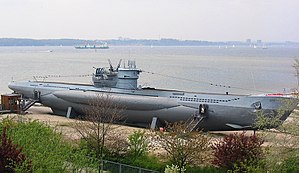German submarine U-1103 was a Type VIIC/41 U-boat of Nazi Germany's Kriegsmarine during World War II.
 U-995 Type VIIC/41 at the Laboe Naval Memorial. This U-boat is almost identical to U-1103.
| |
| History | |
|---|---|
| Name | U-1103 |
| Ordered | 14 October 1941 |
| Builder | Nordseewerke, Emden |
| Yard number | 225 |
| Laid down | 26 May 1943 |
| Launched | 12 October 1943 |
| Commissioned | 8 January 1944 |
| Fate |
|
| General characteristics | |
| Type | Type VIIC/41 submarine |
| Displacement | |
| Length |
|
| Beam |
|
| Height | 9.60 m (31 ft 6 in) |
| Draught | 4.74 m (15 ft 7 in) |
| Installed power |
|
| Propulsion |
|
| Speed |
|
| Range | |
| Test depth |
|
| Complement | 44-52 officers & ratings |
| Armament |
|
| Service record | |
| Part of: |
|
| Identification codes: | M 31 936 |
| Commanders: | |
| Operations: | None |
| Victories: | None |
She was ordered on 14 October 1941, and was laid down on 26 May 1943, at Nordseewerke, Emden, as yard number 225. She was launched on 12 October 1943, and commissioned under the command of Kapitänleutnant Hans Bungards on 8 January 1944.[6]
Design
editGerman Type VIIC/41 submarines were preceded by the heavier Type VIIC submarines. U-1103 had a displacement of 769 tonnes (757 long tons) when at the surface and 871 tonnes (857 long tons) while submerged. She had a total length of 67.10 m (220 ft 2 in), a pressure hull length of 50.50 m (165 ft 8 in), an overall beam of 6.20 m (20 ft 4 in), a height of 9.60 m (31 ft 6 in), and a draught of 4.74 m (15 ft 7 in). The submarine was powered by two Germaniawerft F46 four-stroke, six-cylinder supercharged diesel engines producing a total of 2,800 to 3,200 metric horsepower (2,060 to 2,350 kW; 2,760 to 3,160 shp) for use while surfaced, two SSW GU 343/38-8 double-acting electric motors producing a total of 750 metric horsepower (550 kW; 740 shp) for use while submerged. She had two shafts and two 1.23 m (4 ft) propellers. The boat was capable of operating at depths of up to 230 metres (750 ft).[7]
The submarine had a maximum surface speed of 17.7 knots (32.8 km/h; 20.4 mph) and a maximum submerged speed of 7.6 knots (14.1 km/h; 8.7 mph). When submerged, the boat could operate for 80 nautical miles (150 km; 92 mi) at 4 knots (7.4 km/h; 4.6 mph); when surfaced, she could travel 8,500 nautical miles (15,700 km; 9,800 mi) at 10 knots (19 km/h; 12 mph). U-1103 was fitted with five 53.3 cm (21 in) torpedo tubes (four fitted at the bow and one at the stern), fourteen torpedoes or 26 TMA or TMB Naval mines, one 8.8 cm (3.46 in) SK C/35 naval gun, (220 rounds), one 3.7 cm (1.5 in) Flak M42 and two 2 cm (0.79 in) C/30 anti-aircraft guns. The boat had a complement of between forty-four and fifty-two.[7]
Service history
editOn 5 May 1945, U-1103 surrendered at Cuxhaven, Germany and was later transferred from Wilhelmshaven to Loch Ryan, Scotland. Of the 156 U-boats that eventually surrendered to the Allied forces at the end of the war, U-1103 was one of 116 selected to take part in Operation Deadlight. U-1103 was towed out and sank on 30 December 1945, by naval gunfire.[6]
The wreck now lies at 56°03′N 10°05′W / 56.050°N 10.083°W.[6]
See also
editReferences
edit- ^ Helgason, Guðmundur. "Hans Bungards". German U-boats of WWII - uboat.net. Retrieved 24 March 2016.
- ^ Helgason, Guðmundur. "Werner Sausmikat". German U-boats of WWII - uboat.net. Retrieved 24 March 2016.
- ^ Helgason, Guðmundur. "Karl-Heinz Schmidt". German U-boats of WWII - uboat.net. Retrieved 24 March 2016.
- ^ Helgason, Guðmundur. "Jürgen Iversen". German U-boats of WWII - uboat.net. Retrieved 24 March 2016.
- ^ Helgason, Guðmundur. "Wilhelm Eisele". German U-boats of WWII - uboat.net. Retrieved 24 March 2016.
- ^ a b c Helgason, Guðmundur. "U-1103". German U-boats of WWII - uboat.net. Retrieved 24 March 2016.
- ^ a b Gröner 1991, pp. 43–44.
Bibliography
edit- Busch, Rainer; Röll, Hans-Joachim (1999). German U-boat commanders of World War II : a biographical dictionary. Translated by Brooks, Geoffrey. London, Annapolis, Md: Greenhill Books, Naval Institute Press. ISBN 1-55750-186-6.
- Busch, Rainer; Röll, Hans-Joachim (1999). Deutsche U-Boot-Verluste von September 1939 bis Mai 1945 [German U-boat losses from September 1939 to May 1945]. Der U-Boot-Krieg (in German). Vol. IV. Hamburg, Berlin, Bonn: Mittler. ISBN 3-8132-0514-2.
- Gröner, Erich; Jung, Dieter; Maass, Martin (1991). German Warships 1815–1945, U-boats and Mine Warfare Vessels. Vol. 2. Translated by Thomas, Keith; Magowan, Rachel. London: Conway Maritime Press. ISBN 0-85177-593-4.